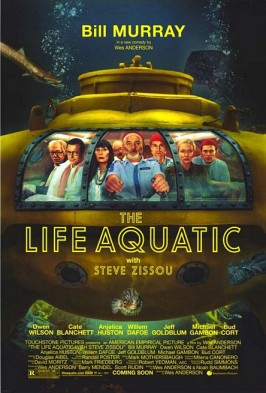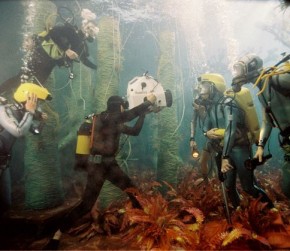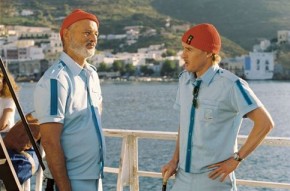The
Life Aquatic
with Steve Zissou
Fame can be troublesome for young directors. One minute
they are crafting their latest project from whatever snippets
of funding they can manage to piece together, working within
the confines of their own means, and hoping that someone
will pluck them from obscurity, freeing them from the shackles
of limited resources. I don’t claim to know this feeling
firsthand, but having witnessed this transition several
times it would seem safe to say that there is a certain
degree of transitioning that is required.
Wes
Anderson has appeared to be the exception to this rule in
the past, but rumors have been circling his latest project,
The Life Aquatic with Steve Zissou, implying that
he has indeed hit the wall with his signature style, pacing,
and quirky sardonic formula. The charges have been that
it is time for Wes to abandon the style that has made him
the success of late, and move on to newer, uncharted waters.
As if there is such a thing.
Anderson’s
debut film Bottle Rocket was a quiet ripple that
grew into resounding appreciation on behalf of critics and
independent film fans. His follow-up, Rushmore,
is largely regarded as his strongest effort, and officially
launched him into the forefront of young new talent. The
Royal Tenenbaums, however, was met with more of a “love
it or hate it” response from critics and audiences
alike, and now it would appear that Aquatic is
even more polarizing. Or so it would seem.
The
word has been out there for some time. It’s been whispered
and hushed but out there, nonetheless. Early detractors
have remained steadfast to the argument that Aquatic
is simply more of the same, and that it has grown tired.
Fortunately, this simply isn’t the case.
Sure,
Anderson is still working in his own stilted self-imposed
world, and fans of Tenenbaums, as am I, will likely
walk away happy with his latest work. However, unlike Tenenbaums,
the subject whom Anderson has wryly chosen to satire this
time out is far subtler. So subtle is it, in fact, that
it would seem that the joke has eluded many in the process.
Aquatic
tells the story of yet another self-centered bastard of
a patriarch, this time in the form of a sea-faring documentarian
named Steve Zissou (Bill Murray). Zissou commands a ship
named The Belafonte, and is no doubt influenced by Jacques
Cousteau and his work documenting sea-life. Zissou’s
crew consists of a wide range of cultural figures played
once again by an eclectic ensemble cast: the German accented
Klaus (Willem Dafoe) looks at Zissou as a surrogate father
of sorts, Wolodarsky (Noah Taylor) is named after a close
friend of Anderson’s, Vikram (Waris Ahluwalia) is
rarely seen without his camera, and Pele (Seu Jorge) spends
most of his time playing acoustic renditions of Bowie songs
in Portuguese.
After
unveiling his latest film depicting the death of his lifelong
partner Esteban (Seymore Cassell) at the hands of the mysterious
“Jaguar-Shark,” Zissou intends to track down
the shark and kill it, for the scientific purpose of revenge.
To complicate matters, a young Kentucky Airman named Ned
Plympton (Owen Wilson) introduces himself to Zissou as his
long lost son, probably. Soon Ned is aboard the Belafonte
seeking resolution with his probable father, just as Zissou
seeks resolve for Esteban’s death. All the while two
other additional characters join the voyage. One is a reporter
named Jane Winslett-Richardson (Cate Blanchett) who is interviewing
Zissou for the cover article of her magazine. The other
is Bill Ubell (Bud Cort) a “bond company stooge”
who’s only job is to protect the interest of the bank
funding the whole expedition, i.e. make certain that Zissou
doesn’t do anything illegal.
This
is a lot of stuff to process, and believe me, it is only
the tip of the iceberg. However this is one of the aspects
of Anderson’s films that many find so endearing. He
crams every beautifully anamorphic Robert Yeoman frame with
so much information that it’s almost as if the whole
experience is running right off the screen in all directions.
Needless
to say, the perpetually stoned Zissou meanders his way here
and there in search for the “Jaguar-Shark,”
often allowing his bull headed commands to muck up the expedition
in the process. One thing is certain from the onset, as
documentarians go Zissou is about as hackneyed as they come.
Yet he is often referred to in some sort of historic regard,
like a celebrity whose flame still burns, albeit a great
deal dimmer than it had before.
This
is where the subject of satire becomes a bit more apparent.
In Zissou, it would appear that Anderson might be reflecting
his own self-image. Here is a man whose career has somewhat
painted him into a corner creatively, so to speak. His frustrations
to remain relevant in the eyes of all of those surrounding
him has somehow blurred his vision and skewed his perspective
to the point of overlooking the things most important in
life.
In the
end, Zissou learns to sit back and enjoy “the adventure”
in it all, and it would seem that Aquatic is just
that in regards to Anderson. In his own way, his projects
would be the equivalent to Zissou’s Belafonte, when
it comes time to set sail on a new adventure, Anderson gathers
a cast and crew that resembles family in many regards. Some
new faces, but many old ones as well.
Sure,
he may not have knocked out a film that surpasses his previous
efforts, but it would appear that Anderson remains true
to what he wants to see onscreen. The result is always something
uniquely his own, and downright enjoyable throughout.
Rating:

|








